Once again, the antis are ramping up in their statements of being poisoned and kids being sprayed at schools. Most rational, reasonable, and logical folks will know that this is far from the truth. There are so many issues surrounding this whole mess of mass information, that I am hopefully going to sort out some of it for folks to calm the flocks and see why you shouldn’t get anxiety ridden from what you read. At the bottom, I have listed great, easy to read links to further your knowledge with. I promise no scary stuff here!
Science 101
Over and over you will hear that the anti-GMO movement is an anti-science movement. Why do people say that? Basically, many of these activists do not understand that science is not a “thing” but a process to build evidence upon.

The scientific method explained simply in a concise table.
Just because a study has been done, it doesn’t mean that it is the “proof” of anything. It has to be taken a step further in the process with reliability and validity. Simply put, reliability and validity are cornerstones of the scientific method. Reliability helps to be sure that a finding is just not a fluke and it can be found again and again by repeating the experiment by different people and with the same conditions. This helps in ensuring that the hypothesis is more likely to be accepted by the scientific community.
Validity refers to whether or not the experiment meets the scientific concept and that the results meet all the requirements of the scientific method. Basically, are you testing for the right thing in the right manner according to the standards established for this research? Do you have a the proper set up of your experiment to determine whether or not your findings are valid for what you are measuring? Do you have the protocols set up to see if you are really seeking to answer the question you’re seeking an answer to?
I’ve seen so many people swear that the lumpy rat study by Seralini is the “proof” that GMOs is dangerous and that it’s all a conspiracy as to why it isn’t take seriously. Seralini did several mistakes in setting up this study to begin with which is the reason why the scientific community doesn’t consider his results as significant. First, we don’t know what he was testing for to begin with as he fed tumor prone rats GM corn with various doses of RoundUp. If you want to find harm, how will you know if it is the corn or if it is the RoundUp? You can’t tell with his protocols. He also does not have any control group to compare his results to. Basically, he had a lot of rats being fed uncontrolled amounts of corn and varied doses of RoundUp. How will you ever sort the data to make determine what caused what? The other issue is that this study hasn’t been repeated either to confirm his bumbling mess of findings. So basically, the only conclusion of the study should be that lumpy rats causes lumpy rats.
Fear Mongering 101
One of the biggest issues with the anti-GMO movement is fear mongering. This table outlines key actions that is used in these
Most people that I know are not able to take a scientific study and interpret it. Many of the lay public tend to read a news snippet of a study but fail to go to the actual study to look closer at it. The news tends to only put on only the conclusions found most of the time. By understanding the basics of the scientific method as a process, you can get a better idea of why what you’re reading on the internet isn’t always “proof” of anything.
Good examples of this is the study of tofu causes dementia snippet many years ago. It scared a whole lot of people here in Hawaii but it never stopped most people from consuming it. When you go to the source of that news story, you’ll see that some researchers went to Indonesia and found a higher incidence of dementia and linked it to soy consumption. More research was likely done and found that the conclusion made does not support that conclusion. If it did, we’d all be avoiding tofu and soy like the plague, but we don’t because the evidence does not support this.
Correlation and Causation
Another concept that is frequently misunderstood by many of our anti-GMO club members is that of correlation and causation. What they tend to think is that because we have a correlation, it automatically means causation. These two concepts are independent of each other and needs further research to determine what factors if any can be tied to make this statement. Many anti-GMO folks are making statements that GMOs are the cause of the rise in autism. If that were true, then the same could be said for the rise in organic food leads to autism based on the data.

Just because two things are correlated, it does not mean causation. Here’s another example of why this shows how misunderstood the concepts are among this crowd. If correlation means causation, ice cream sales causes more murders, living in a poor country causes larger penis sizes, and so many other bizarre things correlate but doesn’t necessarily mean it causes it.
Google University 101
Lots of anti-GMO folks will proudly profess that they have done their research to know the “facts” and why they are staunchly an anti. They did extensive searches across the internet and found so many different videos, news articles, and other “evidence” as to why they are standing with the bikini clad activists. The sad thing is that they tend to post the same links over and over as so called “evidence” and don’t realize that just because you found it on Google does not mean it will substitute for evidence.
What they fail to understand is how Google searches work. Basically, the more clicks a page gets and the more key terms it has on it, it will land up on the first page after you click that search button. Just because it is the first few links you see, it doesn’t mean that the site is well vetted or provides legitimate information. These people also don’t realize that picking certain keywords also brings up different kinds of information. I’m no expert on it so here’s a simple table explaining it out.

Here’s an example of that if I did a search of the “dangers of GMOs.” This is what will come up on my search.
You’ll see many legitimate looking sites like the Institute for Responsible Technology, Dr. Mercola, Food Revolution, Natural News, Collective Evolution, Green Med Info, AltNet News, Natural Cures Not Medicine, GMEducation, Chemtrails, World-Truth, and so on. A person who doesn’t understand the internet workings will go through and read it all and be boiling with fear and hate at how bad GMOs are. These folks will stop there and take a stand against it. I suggest newbies to be added to the GMO FREE Kauai, GMO FREE Oahu, and other GMO Free Facebook groups and see if many of the links being posted on there. So many millions of people just believe all of this for face value and don’t bother to even question some of the info being presented.
Well, for you anti-GMO folks who don’t like getting their links dismissed when asked for evidence on your claims, I suggest you take a different approach to your Google searches. Click on those “Scholarly links” at the top of Google and see the difference in the information. Better yet, do a search on “debunk Institute for Responsible Technology,” and see what you get.
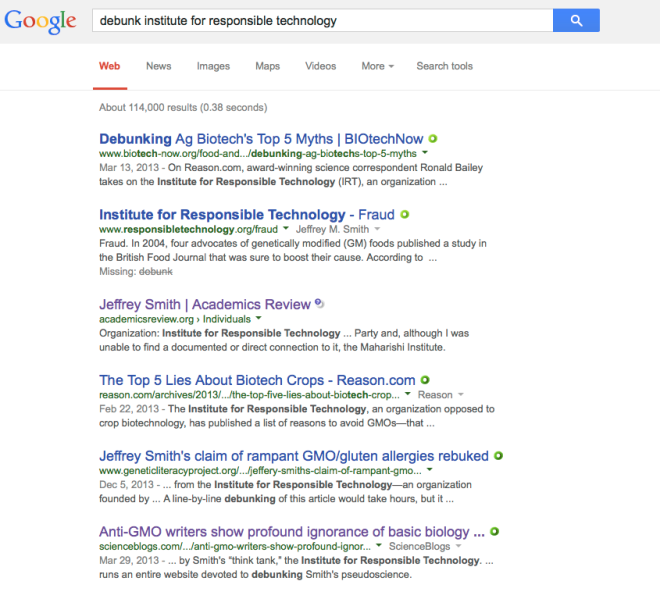
Using a bit of skepticism can give you a completely different picture of information to sort through. Remember, if it starts to scare you, debunk it!
The Confirmation Bias Sinkhole
As you can see, trying to learn more about the GMO issue is extremely complex and tricky to navigate. By understanding the inner workings of the science, searching, and learning a bit of skepticism, you might be able to see a different picture to understand the large scope of what is real and what isn’t. You don’t need to have a science degree or any background to decide for yourself what is true or what isn’t but you do have an obligation to search more about what you’re saying and avoiding the trap of confirmation bias.
Confirmation bias basically means you are looking for only things that support your chosen side and avoid considering any other information presented. If it doesn’t fit the bill, you won’t ever read it. Many entrenched anti-GMO activists are in this sinkhole. You’ll hear the same repetitive statements like school children are being sprayed by pesticides, our water is poisoned, reefs are dying, GMOs cause cancer and birth defects and so on. No data or evidence presented will ever change these people’s thoughts and they are well past the point of having some skepticism about the issue. Do we just ignore the evidence and believe in the anecdotal evidence being said by people to make laws in our islands? No, we need laws based upon evidence that show the need for such legislation.
People who are speaking out for biotechnology are also not “believers.” When the issue comes down to beliefs, it only shows that the basis for such laws is in ideology and not evidence. History has shown us over and over that using beliefs to make laws can cause significant harm to issues that has a ripple effect around the world. In the court of law, beliefs will not hold up to the strength of the the evidence to make a decision upon.
As a person who supports biotechnology, I support the evidence and don’t just “believe” in it. I’ve reviewed the evidence base to show me that this is a technology that we should embrace as a way to feed people, farm the land, and make people’s lives better. We can use ideology to demonize it but the evidence for it outweighs the repetitive claims that consistently are used to attack it.
Systems Thinking and Unintended Consequences
The last concept I will leave you is that of systems thinking in our society. In our language, we have a strict pattern of how we communicate that is very linear. In the scientific method, we have a very linear way of setting up a study and researching it. In real life however, we don’t have the luxury of the equation of, “If I do X, then Y will always result.” Life just doesn’t work that way and nor does the world operate in a linear fashion.
In systems thinking, we see the world as a complex system with the components all being interdependent on each other. It’s kind of like our own human body that has multiple systems that all work in concert together. They don’t operate separately from each other. Our musculoskeletal, nervous, sensory, circulatory, immune, vestibular, and visual systems all work together to maintain homeostasis or the state of being in balance. When one part of our body is affected, many of the systems are affected and it impacts our overall well being. The same thought process can be applied to how we make laws in our state.
If we make a decision to ban GMOs in our islands, we have to ask, what is it going to impact? Activists are cheering the ban on the Big Island but don’t realize that it has affected so many things like how ranchers and the dairy folks will feed their animals sustainably. Nor do they see how the research money coming to study biotechnology for plant diseases are affected should a bad virus hit our crops. When the coffee bean borer keeps decimating crops, the rest of the world is studying Bt coffee to curb this pest, Hawaii can’t protect their own crops because of a ban and is left to using an expensive spray.
If we really want to solve problems and get ahead of the game, we’ve got to think differently and it means thinking in systems concepts. We will land up asking more questions but will be better at addressing the whole issue when you see the whole picture to begin with!
The Power of Thinking and Questioning
With all what’s happening in Hawaii, we’ve got to all stop and think about what we want. The common ground that pro-science people share with activists is that we want a better world. Do we want to continue waging a battle against people who have little to no grasp of some of the basic concepts I discussed earlier? Or do we seek to work with people who are reasonable and have the ability to think about those unintended consequences and can critically question some of the information being presented?
The battle must end if we are to meet our goals or the goals will never become a reality. Instead of yelling about who’s facts are better, its time to sit down that that table and ask questions and have a meaningful discussion about the path we want to take using the evidence available. Only the reasonable ones should be invited to the discussions.
Understanding the Scientific Method
The Scientific Method for Kids
The Scientific Method Explained: Steps, Terms, and Examples (video)
Reliability and Validity in the Scientific Method
Validity and Reliability: How to Assess the Quality of a Research Study (video and explanation)
Hyped GM Maize Study Faces More Scrutiny
Scientists Smell a Rat In Fraudulent Study
Correlation and Causation
Organic Food Causes Autism and Diabetes
Correlation, Causation, Independence
Correlation DOES NOT Imply Causation (video)
Understanding Google Searches
How does a Google search work? (video)
Confirmation Bias
Why Facts Alone Don’t Change People’s Minds in Big Debates
Why People Persist in Believing Things that Aren’t True
Systems Thinking

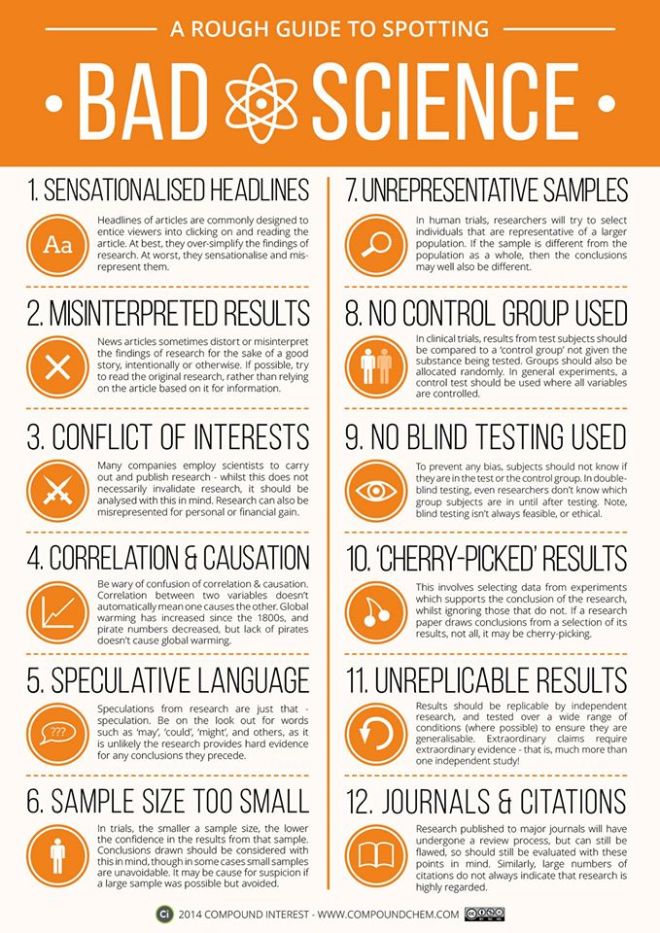
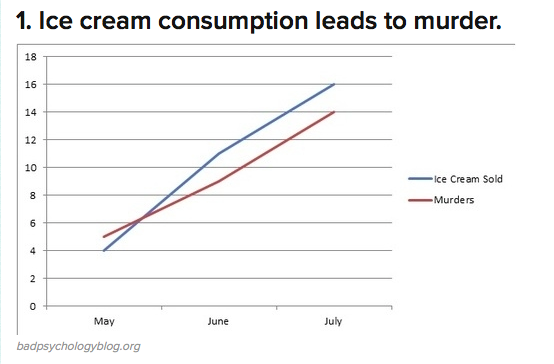
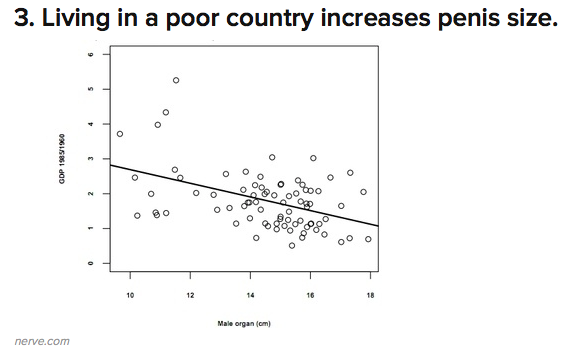
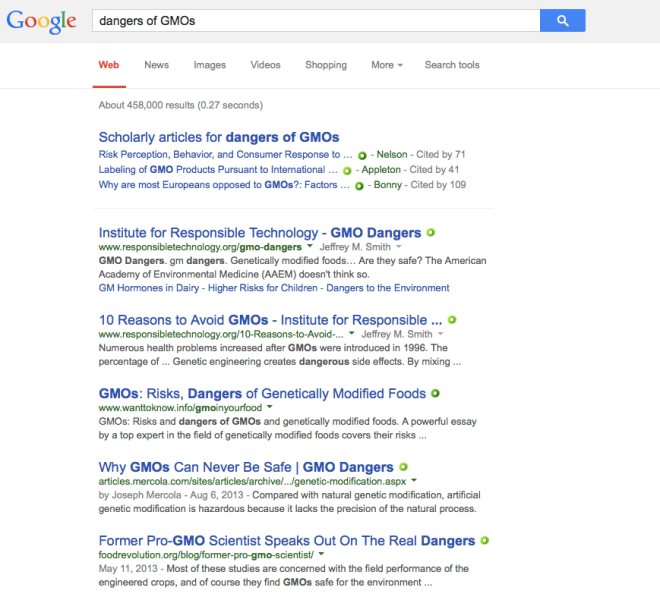
Bravo, Bravo, Bravo…..
The other huge deficit is learning who to trust– how does someone identify a real expert? They tend to trust anyone reinforcing their biases, and ignore qualified voices with sound interpretations that don’t fit their thinking.
We need a who’s who type of page and a meme to go with it. Project number 100!
Love this blog
Pingback: Who Can You Trust in the GMO Issue? | HawaiiFarmersDaughter
Well written and objective. Calm down and think. For yourself.
The Correlation and Causation part makes no sense. When one is looking to link environmental toxins with autism, they will look at data for measured toxins and individuals diagnosed with autism. That doesn’t demonstrate causation, but no researcher should compare sales to autism. How exactly are the sales being sprayed on the food?
Mel, I think the Correlation/Causation part just shows the audacity of unrelated claims. Anybody can cherry-pick “data” to prove their point, no matter how many times it is repeatedly proven to be unrelated. People will look for “data” to fit their belief, to “prove” causation to support their view as “correct,” and to use as a weapon against anyone who opposes them. The point of the “organic food causes autism” is just to prove that point. Any rational human being would realize that organic food causes autism about as frequently as the sun passes through the earth.
Fantastic, love your blog!
This is awesome! It’s such a shame we’re outnumbered (or out shouted) by the ignorant. Damn you Dunning-Kruger!